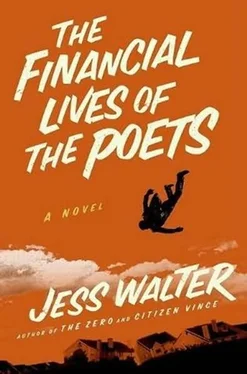“Here we go,” he says, and pulls out the book and hands it to me.
“You can look through this and see if there’s a style you like better.”
I take the book and pretend to leaf through it. Each tree-house picture makes me feel more incompetent than the last.
“You might just buy the book, take it home and look through it to make sure you get the right one,” he says. “There’s no rush, I’m guessing.”
I look up at him.
“I mean, you’re not going to build a tree fort in the winter.”
“In the winter? No.” I laugh. Scoff. “Of course not.” I purse my lips and look back down at the book, make my own clicking noises with my tongue. I wish I’d said I was building something else, anything else -a catapult or gallows or balustrades-anything but a stupid tree fort. Four years ago, when we moved into the house we’re about to lose, I promised the boys that I’d build them a tree fort. Four years later, there’s no tree fort and that sad fact is probably not even in the top ten ways I’ve let the poor boys down.
“So, you built one of these for your kids?”
Chuck is looking through his own copy of Building the Perfect Tree Fort. He shows me a picture. “Kind of like this one.” Then he closes the book and puts it back. He looks off a little wistfully. “It’s at their mother’s house.”
“Ooh. Sorry,” I say. “It’s tough when a marriage breaks up. Let’s hope there’s a special place in hell for anyone who would break up a-”
But by putting the book back, Chuck has opened the door for a man’s man in coveralls who was waiting for his help, and before I can finish my pointed little comment about cuckolders deserving Dante’s seventh circle, this guy slides his lumber wish list in front of Chuck, like he’s the goddamn Lumber Fairy, and I wonder why the jerk can’t go get this stuff himself. He looks capable. He’s
in coveralls. Still, Chuck excuses himself to go help the real customer.
And I stand alone holding a book about
how to build the tree fort
I will never build
in the freezing thirty-foot-high aisle
of my many deficiencies
while the man stealing my wife
goes off to gather more wood.
My Stupid Idea
M-Tronic Reports Strong Q3
Higher than expected orders and
a reversal of its earnings direction
have led to an upward adjustment of
M-Tronic’s third quarter projection
and revived hopes for a sector move
despite several analysts’ rejection.
I know it sounds stupid in hindsight, and perhaps in foresight too, but my idea was that someone needed to start a website that gave financial news and advice…in verse.
Actually, it’s not quite as stupid as that. My idea was that the site would not just feature poetry, but a higher level of financial writing-think of it as money-lit. People spend so much time thinking about business and finance, about their mortgages, about investing, about their retirement and college funds; hell, after 7/11, it was all anyone talked about, as if we’d had a collective midlife crisis. But the writing about those things has always seemed so dry. My site was supposed to remedy that, by featuring all sorts of literary writing about the financial world-creative essays, profiles of brokers, short fiction about business, and what I called “investment memoirs”-first-person chronicles by investors and professionals (for instance, a commissioned broker piece: My Season in Purgatory: How an Otherwise Savvy Trader Fell for the Convertible Bond Lie). The hook, though, was poetry-not because I felt there was some great demand for a quatrain about consumer confidence, but because I thought people would simply be drawn to the anachronism of it-like the European TV channel where the news is read by topless anchors. Investment poetry would draw in the curious, get newspapers and TV stations to do bemused features about us, and this, then, would open the door for a literary discussion of the thing that most of us spent so many days thinking about: our money.
And so: poetfolio.com -conceived in overheated-but-honest passion, its home page still pinned to my laptop like the refrigerator-taped ultrasound of a stillborn baby. I can close my eyes and still see that beautiful beta page: a humor piece about the return of tech stocks written like a horror story (Night of the Living Tech); a frankly mediocre investment memoir from a woman who funded only socially progressive companies (Redefining a GOOD Investment), a handful of smart, short rhymed business shorts down the right side, and my favorite-a rollicking heroic poem about the first step in saving for your kids’ college (The Ballad of a 529 Plan).
Even with that perfectly reasonable explanation, and perfectly realized home page, I still feel the need to defend my idea, by tracing the synaptic misfires that went into creating it. My thoughts went something like this: A. people don’t read poetry much anymore. B. I like poetry, or at least I did in college. C. I’m not sure
I understand the poetry I read in journals now; it seems like another language, disconnected from my undergrad Keats, Stevens and Neruda. D. This new poetry seems rooted in abstract language and has little to do with the real world. E. I have spent most of my life covering the real world as a journalist, first for a small business publication and then for the local newspaper. F. In that time, I’ve noticed that business writing is the driest, boringest, least imaginative writing in the world. G. At one time, I wanted to be a poet. H. It’s really too bad people don’t read poetry; they should. I. Early middle age is such a creepy time, and I constantly find myself wishing I were more like the younger me. J. Perhaps fiscal poetry is the perfect union of my overworked, analytical, continuous-list-making left-brain and my seemingly ignored creative right.
Conclusion: I shall now quit my job and endanger my family’s future to follow my youthful dream of writing stock news and tips in pedestrian, amateurish verse.
The thing that finally tipped me over the edge was when I read a story about the heiress to this big fortune leaving a huge pot of money for the advancement of poetry. I wrote a grant proposal and a business plan, and shocked myself by getting some actual funding (though far less than I ended up needing). Whenever I described the idea, people smiled and I suppose I mistook their bemusement for enthusiasm. I bought two new computers, hired a tech/ad specialist to help create the website and to sell advertising, rented a little office, and, hell, when you get a grant and people are smiling and the start-up costs are minimal, you kind of have to go through with it. I quit my job, built my site, quickly burned through the tiny grant, emptied our savings, went in debt, stalled, spent six months fretting, and then got ice-cold feet, realizing at the last minute, days before we were supposed to go live, that no way in hell was anyone ever going to use the Internet to read poems about-
“Dan Fouts,” my father says as we watch football highlights on SportsCenter, as we always do after dinner. “He threw the prettiest ball. He had a beard you know.”
“Yep,” I say. My dad always brings up the old bearded quarterback, Dan Fouts.
“I don’t know how he played in that beard.” My father pinches his face when he watches TV, like a trial judge unhappy with the lawyers in his courtroom.
“Hmm.”
“Had to be itchy.”
“You think?”
“Sure. You know who else threw a nice ball?”
I can hear typing coming from upstairs, the rackety tap-tap of plastic keys, Lisa on the computer again, no doubt telling Chuck how she dreams of caressing his-
Читать дальше










